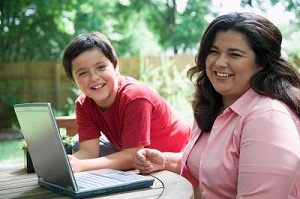Developing a Strategy for Child Safety on the Internet
Posted by PLB · Leave a Comment

 As parents and educators, we are responsible for protecting our children and the online world magnifies those opportunities as well as complicates the ways in which we must be aware.
As parents and educators, we are responsible for protecting our children and the online world magnifies those opportunities as well as complicates the ways in which we must be aware.
Through the internet and phone networks that teens use everyday, they have easy access to others, and are easily accessible by others. Electronic communication is such a part of children’s everyday life that it actually comes up in almost every conversation. If not directly, then indirectly as children access a text message or try and chat even in the middle of a face-to-face conversation.
It is important, therefore, to take the opportunity to guide your child on what is appropriate while using these services. It is imperative that you win their trust before you stress on honesty and transparency in their online dealings.
Experts suggest the following general rules and precautions for child safety on the internet.
- Don’t share personal information.
- If someone crosses the line and makes you feel uncomfortable about what is happening, stop and report it immediately.
- Don’t meet anyone in person without your parents’ permission and without being accompanied by them.
An effective method of dealing with this situation is to create an Internet Use Agreement. It is suggested that you put this agreement together with your child so that they are clear about your expectations and understand the consequences of breaking the rules that they helped outline.
A family Internet Use Agreement is also a good starting point for discussions about child safety on the internet. Some examples of clauses are –
- I will never communicate via the phone for the first time with someone I met online without my parent/guardian’s permission.
- I will never meet anyone for the first time that I met online without my parent/guardian’s permission AND accompanied by them or someone they approve.
- I will only post or send out pictures or images that my parent/guardian has approved AND with their knowledge that I am doing so.
- I will tell my parent/guardian if I am approached by someone in a sexual nature OR receive unsolicited sexual material.
From Professional Learning Board’s online continuing education course for teachers: Internet Safety: Protecting Children in an Online World



